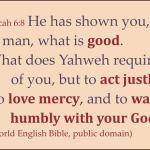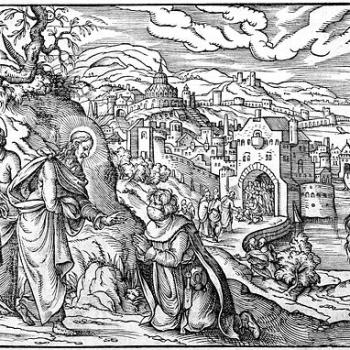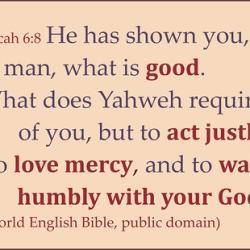“Who Is My Neighbor?”
This year, the lectionary reading of the Good Samaritan coincided almost exactly with Eid al-Adha. Christians reading a Jewish parable on the most sacred of Muslim holidays provides the perfect opportunity to ponder and embody what it means to love our neighbor.
Sibling Rivalry
The story of the Good Samaritan is so familiar that it’s easy to miss the point for thinking we know it already. “Samaritan” in modern culture has become synonymous with “do-gooder,” as if the term “good Samaritan” is redundant. But first century Jews would have heard “good Samaritan” as an oxymoron. Samaritans were the enemy.
The Samaritans were kin to Jews, descendants of Abraham. But after the golden days of David and Solomon, Israel broke into two kingdoms, essentially with the Samaritans to the north and the Judeans, with Jerusalem as their capital, to the South. They were relatives and neighbors, but also rivals who branched out in different directions and experienced separate tragedies that they didn’t expect the “other” to understand. They came to different interpretations of their shared ancestral history.
The scandal of small differences! Rival claims to the same history and competing interpretations of faith often generate more frustration and hatred than complete separation.
Being Loved Out of Enmity
A lawyer asks Jesus what he must do to inherit eternal life. Jesus prompts him to answer that the essence of the Law is to love God with all of one’s heart, soul, strength, and mind, and to love one’s neighbor as one’s self. But the lawyer presses further, asking “Who is my neighbor?”
With the lawyer’s second question, he is really asking “Who is not my neighbor? Where can my love and mercy end?”
Rather than tell the lawyer whom he must love, Jesus invites him into a place of vulnerability so that he may recognize his need to be loved by anyone. He tells a story of a man who was going down from Jerusalem when robbers ambush him and leave him unconscious in a ditch. A priest and a Levite each pass him by without helping. Finally, a Samaritan sees him and springs into action, binding his wounds, sheltering him, and paying for his care. Jesus then asks the lawyer who acted like a neighbor, and the lawyer is compelled to recognize the mercy of the one he deemed “enemy.”
Jesus’ answer encompassses love of enemies, but it is even more subversive than that. Jesus calls us to recognize that those we see as enemies can be neighbors, even life-savers, to us.
Recognizing the kindness of our enemies to us is completely humbling, breaking our hearts open to the truth that enmity denies. Jesus invites us to see the humanity in our enemies and to reclaim our own humanity by allowing ourselves to be loved by the “other.” Rivalry dehumanizes, but loving and allowing ourselves to be loved breaks down divisions and restores the interconnection that makes us human.
Love dissolves enmity. “Loving our enemies” means recognizing that we do not need to be enemies at all.
Anti-Semitic Ways To Miss The Point
The parable of the Good Samaritan calls us to recognize that abundant, meaningful life is found not in defining ourselves over and against each other, but in living for one another.
Thus it’s ironic that Christians tend to identify with the Samaritan against the Jewish characters in this story, replicating the very rivalry between Jews and Samaritans that the parable indicts!
As Jewish New Testament scholar Dr. Amy-Jill Levine points out, Christians often use this story to contrast Judaism — which they characterize with tribalism and purity laws — with Christianity, characterized by boundless mercy and generosity. For example, many Christians explain that the priest and the Levite do not stop to help the man in the ditch because it would make them unclean. The implication is that, according to Judaism, cleanliness is more important than compassion.
Dr. Levine debunks this nonsense by emphasizing that according to Judaism, nothing is more important than saving a life. Not ritual purity, not Sabbath observance. Nothing.
This story indicts not Judaism, but rather the failure to live into the full mercy for which Judaism calls. Jesus calls on the lawyer to live by the law of Love which Judaism teaches but which also flows from the Spirit into Samaritan as well as Jew. Love inspires everyone, regardless of the divisions we construct in rivalry over different understandings of faith and culture.
When Christians fail to recognize this, we set ourselves in rivalry with Judaism, spectacularly failing to live into the compassion, humility, and empathy for which Jesus calls. Jesus’ explicit call to imitate the Samaritan is an implicit call for us to remember those whom we have not treated as neighbors, and to repent of our lack of neighborliness. For Christians this includes repenting of the anti-Semitism that occurs when we measure Christianity against Judaism.

Eid Al-Adha: Sacrificing Ego and Enmity; Gathering In Love
Last week, Muslims celebrated Eid Al-Adha. Muslims of all nations, colors, languages, and interpretations of faith, saw God’s peace and love reflected in the eyes of their neighbors from around the world. Shoulder to shoulder, they worshipped God in humility and gratitude.
Eid Al-Adha, the holiday of the pilgrimage (Hajj) that Muslims are obliged to make at least once in a lifetime, translates to “the Holiday of Sacrifice.” Muslims commemorate how Abraham, patriarch of Judaism, Christianity, and Islam, was willing to sacrifice his son, Ishmael, who according to Islam was also willing to die for God. But when God stayed Abraham’s hand, God revealed God’s desire for mercy, not sacrifice.
Humanity’s ancient way of appeasing false gods born of fear and rivalry was to sacrifice others. Violence was given a false veneer of righteousness under the designation of “sacrifice.” We still worship false gods when we demonize, marginalize, neglect and kill for security, wealth, power, or a “righteous” sense of identity against others.
When God stays Abraham’s hand, God calls Abraham, and humanity, out of, not into, sacrifice. Or rather, God calls us to a new understanding of sacrifice. Rather than sacrifice the vulnerable through greed and exploitation, rather than live in rivalries that puff ourselves up and condemn the “other,” we are called to sacrifice our ways of living and finding identity against each other. It’s a sacrifice of enmity and ego that is replaced with humility and beloved community.
According to Islam, Abraham and Ishmael built the Kaaba, the house of worship drawing pilgrims from around the world, after God spared Ishmael’s life. Nothing better demonstrates the sacrifice of ego and the call to love one another than putting differences aside to come together physically as well as spiritually, worshipping the Most Compassionate, Most Merciful One.
Loving Across Boundaries
The point of the Good Samaritan and of Eid Al-Adha is that abundant living consists of making no distinction between loving God and loving everyone, beyond boundaries, limits, and expectations.
When Jesus tells the parable of the Good Samaritan, he says nothing about the Samaritan’s difference of faith. The Samaritan exemplifies not only a good neighbor, but one who has found the key to joyful, abundant life by loving beyond bounds of enmity.
It’s not that religious differences don’t matter; they can be catalysts for dialogue and learning. But if religious differences keep us from loving one another, then they also keep us from fully loving God, rendering our religions useless.
Eid Al-Adha demonstrates that coming together is itself an act of worship, not just a prerequisite for it. Muslims, like members of every other religion, have unique and varied interpretations of faith. Yet they come together across religious differences as well as differences of color, language, nationality, and ideology. Uniting across differences honors the beauty and wisdom of the God who made humanity in all its diversity precisely so that we could come to know one another.
It’s impossible to honestly pray shoulder to shoulder alongside someone you consider an enemy. It’s impossible to wish peace upon co-worshippers one day and turn guns on them the next. It’s impossible to bow down together one day and live in relationships of excess wealth and dire poverty the next.
Thus the story of the Good Samaritan and the holiday of Eid Al-Adha call upon us to repent of our enmity with our fellow human beings in order to fully love God. And loving God is not a matter of ritual or right belief, but a matter of compassionate living.
What Efforts Are We Making to Love Our “Enemies?”
How do we “Go and do likewise?” How do we live in the spirit of shoulder-to-shoulder humility and gratitude to the All Merciful, All Compassionate God, whether we are Muslim or not?
What efforts are we making to love those whom we have treated as enemies?
I think about the ways in which the Christian scripture is interpreted anti-Semitically, leading to biases and acts of hatred. I realize that I cannot know without making an effort to learn, and commit to listening to my Jewish friends and scholars like Dr. Amy-Jill Levine and adjusting my understanding of scripture, and its message for my life, accordingly.
I think of the ongoing Islamophobia in my country, fueled by ignorance and policies of war-making and imperialism. I think of the way my Muslim friends host interfaith events and dialogues to show the beauty of Islam and its common roots with Judaism and Christianity. I commit to participating in and amplifying those events. I also commit to sharing the stories of Muslims worldwide, especially those living in nations under constant threat of US bombs and drones.
I think of the racist, sexist, queerphobic and shame-inducing interpretations of Christianity that devaste so many lives. I commit to repairing the damage of deadly theology by promoting life-giving theology, recognizing that theology is only life-giving when it is a tool of, not prerequisite for, Love.
I pray for love across faiths, across ideologies, across questions that can make for debate but should never make for hate. I pray for love that opens my eyes to the beauty and needs of the people around me. I pray for love to humble me, that I may recognize love from unexpected sources.
How will you “go and do likewise?”
What may we do together?
Images: 1. “Love Thy Neighbor, No Exceptions” by Joe Flood via Flicker, available via Creative Commons License. 2. Premier’s Statement on Eid Al-Adha via Flickr.

















